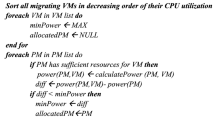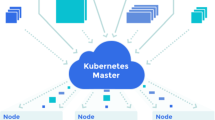Abstract
The task’s slack is the key issue to reduce the energy consumed by DVFS-enabled computing platforms. Despite the large number of scheduling algorithms that are presented in the literature, only a unique scaling axiomatic approach (SAA) is utilized in the scaling phase of the algorithms. SAA simply extends the execution of the task within its slack if a suitable scaling frequency is available. Unfortunately, when dependent-tasks applications are scheduled on such platforms, scheduling algorithms minimize the tasks’ slacks to reduce the overall completion time of the application tasks. This paper presents a mechanism that can be applied to any schedule produced by a dependent-task scheduling algorithm for both homogeneous and heterogeneous DVFS-enabled computing platforms. The proposed mechanism is called BlackLight. BlackLight attempts to extend the tasks’ slacks via rescheduling the application tasks without violating the overall completion time of the application tasks. The proposed mechanism is applied to a large number of dependent-tasks schedules of both random generated application graphs and two real-world application graphs. The experimental results based on a computer simulation show that the proposed mechanism significantly extends the tasks’ slacks compared with SAA , which leads to more reduction in the consumed energy.











Similar content being viewed by others
References
Maurya AK, Modi K, Kumar V, Naik NS, Tripathi AK (2020) Energy-aware scheduling using slack reclamation for cluster systems. Clust Comput 23(2):911–923
Barzegar B, Motameni H, Movaghar A (2019) Eatsdcd: a green energy-aware scheduling algorithm for parallel task-based application using clustering, duplication and dvfs technique in cloud datacenters. J Intell Fuzzy Syst 36(6):5135–5152
Dobhal A et al (2016) Improved real-time energy aware parallel task scheduling in a cluster. in 2016 3rd International Conference on Computing for Sustainable Global Development (INDIACom).0 IEEE pp 475–480
Zong Z, Manzanares A, Ruan X, Qin X (2010) Ead and pebd: two energy-aware duplication scheduling algorithms for parallel tasks on homogeneous clusters. IEEE Trans Comput 60(3):360–374
Alaei M, Khorsand R, Ramezanpour M (2021) An adaptive fault detector strategy for scientific workflow scheduling based on improved differential evolution algorithm in cloud. Applied Soft Computing 99:106895
Hassan HA, Salem SA, Saad EM (2020) A smart energy and reliability aware scheduling algorithm for workflow execution in dvfs-enabled cloud environment. Fut Gen Comput Syst 112:431–448
Khattar N, Sidhu J, Singh J (2019) Toward energy-efficient cloud computing: a survey of dynamic power management and heuristics-based optimization techniques. J Supercomput 75(8):4750–4810
Hu Y, Liu C, Li K, Chen X, Li K (2017) Slack allocation algorithm for energy minimization in cluster systems. Fut Gen Comput Syst 74:119–131
Wang L, Khan SU, Chen D, KołOdziej J, Ranjan R, Xu C-Z, Zomaya A (2013) Energy-aware parallel task scheduling in a cluster. Fut Gen Comput Syst 29(7):1661–1670
Rizvandi NB, Taheri J, Zomaya AY (2011) Some observations on optimal frequency selection in dvfs-based energy consumption minimization. J Par Dist Comput 71(8):1154–1164
G. Von Laszewski, L. Wang, A. J. Younge, and X. He, “Power-aware scheduling of virtual machines in dvfs-enabled clusters,” in 2009 IEEE International Conference on Cluster Computing and Workshops. IEEE, 2009, pp. 1–10
Kada B, Kalla H (2019) An efficient fault-tolerant scheduling approach with energy minimization for hard real-time embedded systems. Cybernet Inf Technol 19(4):45–60
G. L. Stavrinides and H. D. Karatza, “Energy-aware scheduling of real-time workflow applications in clouds utilizing dvfs and approximate computations,” in 2018 IEEE 6th International Conference on Future Internet of Things and Cloud (FiCloud). IEEE, 2018, pp. 33–40
Safari M, Khorsand R (2018) Energy-aware scheduling algorithm for time-constrained workflow tasks in dvfs-enabled cloud environment. Simul Modell Pract Theory 87:311–326
Xie G, Zeng G, Xiao X, Li R, Li K (2017) Energy-efficient scheduling algorithms for real-time parallel applications on heterogeneous distributed embedded systems. IEEE Trans Parallel Dist Syst 28(12):3426–3442
N. Kaur, S. Bansal, and R. K. Bansal, “Towards energy efficient scheduling with dvfs for precedence constrained tasks on heterogeneous cluster system,” in 2015 2nd International Conference on Recent Advances in Engineering & Computational Sciences (RAECS). IEEE, 2015, pp. 1–6
Singh J, Auluck N (2014) Dvfs and duplication based scheduling for optimizing power and performance in heterogeneous multiprocessors. in Proceedings of the High Performance Computing Symposium, pp 1–8
N. B. Rizvandi, J. Taheri, A. Y. Zomaya, and Y. C. Lee, “Linear combinations of dvfs-enabled processor frequencies to modify the energy-aware scheduling algorithms,” in 2010 10th IEEE/ACM International Conference on Cluster, Cloud and Grid Computing. IEEE, 2010, pp. 388–397
Xu H, Li R, Pan C, Li K (2019) Minimizing energy consumption with reliability goal on heterogeneous embedded systems. J Parallel Dist Comput 127:44–57
Ali H, Tariq UU, Liu L, Panneerselvam J, Zhai X, “Energy optimization of streaming applications in iot on noc based heterogeneous mpsocs using re-timing and dvfs,” in, (2019) IEEE SmartWorld, Ubiquitous Intelligence & Computing, Advanced & Trusted Computing, Scalable Computing & Communications, Cloud & Big Data Computing, Internet of People and Smart City Innovation (SmartWorld/SCALCOM/UIC/ATC/CBDCom/IOP/SCI). IEEE 2019:1297–1304
Stavrinides GL, Karatza HD (2019) An energy-efficient, qos-aware and cost-effective scheduling approach for real-time workflow applications in cloud computing systems utilizing dvfs and approximate computations. Fut Gen Comput Syst 96:216–226
Juarez F, Ejarque J, Badia RM (2018) Dynamic energy-aware scheduling for parallel task-based application in cloud computing. Fut Gen Comput Syst 78:257–271
Wu T, Gu H, Zhou J, Wei T, Liu X, Chen M (2018) Soft error-aware energy-efficient task scheduling for workflow applications in dvfs-enabled cloud. J Syst Architect 84:12–27
Safari M, Khorsand R (2018) Pl-dvfs: combining power-aware list-based scheduling algorithm with dvfs technique for real-time tasks in cloud computing. J Supercomput 74(10):5578–5600
Jiang J, Lin Y, Xie G, Fu L, Yang J (2017) Time and energy optimization algorithms for the static scheduling of multiple workflows in heterogeneous computing system. J Grid Comput 15(4):435–456
Zhang Y, Wang Y, Wang H, “Energy-efficient task scheduling for dvfs-enabled heterogeneous computing systems using a linear programming approach,” in, (2016) IEEE 35th International Performance Computing and Communications Conference (IPCCC). IEEE 2016:1–8
Tang Z, Cheng Z, Li K, Li K, “An efficient energy scheduling algorithm for workflow tasks in hybrids and dvfs-enabled cloud environment,” in, (2014) Sixth International Symposium on Parallel Architectures, Algorithms and Programming. IEEE 2014:255–261
El-Rewini H, Ali HH, Lewis T (1995) Task scheduling in multiprocessing systems. Computer 28(12):27–37
Hagras T, Janeček J (2005) A high performance, low complexity algorithm for compile-time task scheduling in heterogeneous systems. Par Comput 31(7):653–670
R. Sakellariou, H. Zhao, and E. Deelman, “Mapping workflows on grid resources: experiments with the montage workflow,” in Grids, P2P and services computing. Springer, 2010, pp. 119–132
Q. Jiang, Y. C. Lee, and A. Y. Zomaya, “Executing large scale scientific workflow ensembles in public clouds,” in 2015 44th International Conference on Parallel Processing. IEEE, 2015, pp. 520–529
Atef A, Hagras T, Mahdy YB, Janeček J (2017) Lower-bound complexity algorithm for task scheduling on heterogeneous grid. Computing 99(11):1125–1145
Olteanu A, Marin A (2011) Generation and evaluation of scheduling dags: how to provide similar evaluation conditions. Comput Sci Master Res 1(1):57–66
Bharathi S, Chervenak A, Deelman E, Mehta G, Su M-H, Vahi K, “Characterization of scientific workflows,” in, (2008) third workshop on workflows in support of large-scale science. IEEE 2008:1–10
G. Berriman, J. Good, A. Laity, A. Bergou, J. Jacob, D. Katz, E. Deelman, C. Kesselman, G. Singh, M.-H. Su et al., “Montage: a grid enabled image mosaic service for the national virtual observatory,” in Astronomical Data Analysis Software and Systems (ADASS) XIII, vol. 314, 2004, p. 593
Smith G (2019) The fast fourier transform and its applications
Author information
Authors and Affiliations
Corresponding author
Additional information
Publisher's Note
Springer Nature remains neutral with regard to jurisdictional claims in published maps and institutional affiliations.
Rights and permissions
About this article
Cite this article
Hagras, T. Slack extender mechanism for greening dependent-tasks scheduling on DVFS-enabled computing platforms. J Supercomput 78, 6275–6295 (2022). https://doi.org/10.1007/s11227-021-04112-9
Accepted:
Published:
Issue Date:
DOI: https://doi.org/10.1007/s11227-021-04112-9




